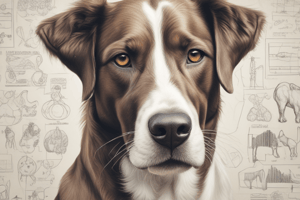Podcast
Questions and Answers
What is a primary role of veterinary public health?
What is a primary role of veterinary public health?
- To prevent and control diseases affecting both animals and humans (correct)
- To increase livestock production efficiency
- To promote animal entertainment
- To improve animal breeding techniques
What is a characteristic of zoonotic diseases?
What is a characteristic of zoonotic diseases?
- They do not require veterinary intervention
- They can be transmitted between animals and humans (correct)
- They only occur in domestic animals
- They exclusively affect humans
Which ethical principle is NOT a standard that veterinarians are expected to uphold?
Which ethical principle is NOT a standard that veterinarians are expected to uphold?
- Honesty
- Compassion
- Dishonesty (correct)
- Integrity
Why are ethical decisions important in veterinary medicine?
Why are ethical decisions important in veterinary medicine?
What role do veterinarians play in preventing infectious diseases?
What role do veterinarians play in preventing infectious diseases?
What is the primary focus of veterinary medicine?
What is the primary focus of veterinary medicine?
Which specialization focuses on the treatment and care of horses?
Which specialization focuses on the treatment and care of horses?
What degree is commonly held by veterinary professionals?
What degree is commonly held by veterinary professionals?
What role do veterinarians play in animal healthcare?
What role do veterinarians play in animal healthcare?
Which area of veterinary medicine deals with the dental health of animals?
Which area of veterinary medicine deals with the dental health of animals?
What type of animal care does small animal medicine primarily focus on?
What type of animal care does small animal medicine primarily focus on?
What is a critical skill for veterinarians when interacting with pet owners?
What is a critical skill for veterinarians when interacting with pet owners?
What kind of experience is typically included in veterinary education?
What kind of experience is typically included in veterinary education?
Flashcards
Veterinary Public Health
Veterinary Public Health
The field that focuses on preventing and controlling diseases that can be transmitted between animals and humans.
Zoonotic Diseases
Zoonotic Diseases
Diseases that can spread from animals to humans.
Veterinarians' Role in Public Health
Veterinarians' Role in Public Health
Veterinarians play a crucial role in protecting both animal and human health by preventing disease spread.
Ethical Standards in Veterinary Practice
Ethical Standards in Veterinary Practice
Signup and view all the flashcards
Ethical Decisions in Veterinary Medicine
Ethical Decisions in Veterinary Medicine
Signup and view all the flashcards
Veterinary Medicine
Veterinary Medicine
Signup and view all the flashcards
Small Animal Medicine
Small Animal Medicine
Signup and view all the flashcards
Large Animal Medicine
Large Animal Medicine
Signup and view all the flashcards
Equine Medicine
Equine Medicine
Signup and view all the flashcards
Exotic Animal Medicine
Exotic Animal Medicine
Signup and view all the flashcards
Veterinary Education
Veterinary Education
Signup and view all the flashcards
Veterinary Practice
Veterinary Practice
Signup and view all the flashcards
Communication with Pet Owners
Communication with Pet Owners
Signup and view all the flashcards
Study Notes
Veterinary Medicine Overview
- Veterinary medicine is the branch of medicine focused on animal health and well-being.
- It encompasses various specialties like surgery, internal medicine, dentistry, ophthalmology, and nutrition.
- Veterinarians diagnose and treat animal illnesses, injuries, and health problems.
- They perform surgery, provide preventative care, and conduct research on animal health.
- Veterinary care ranges from farm animals to companion animals like dogs and cats.
Veterinary Specializations
- Small animal medicine: Focuses on companion animals (dogs, cats, rabbits).
- Large animal medicine: Specializes in farm animals (cattle, horses, sheep, pigs).
- Equine medicine: A specialization within large animal medicine, focusing on horses.
- Exotic animal medicine: Treats animals not typically considered companion or farm animals (reptiles, birds, zoo animals).
- Veterinary surgery: Performs surgical procedures, from routine to complex reconstructive surgeries on animals.
- Veterinary dentistry: Diagnoses and treats dental issues in animals.
- Veterinary internal medicine: Addresses chronic diseases and disorders in animals through diagnosis, treatment, and prevention.
Veterinary Education and Training
- Veterinary professionals typically have a DVM (Doctor of Veterinary Medicine) or DVMS (Doctor of Veterinary Medicine and Surgery) degree.
- Veterinary education combines classroom learning, laboratory work, and hands-on clinical experience over several years.
- Advanced training and certifications in specific areas are also common.
Veterinary Practice
- Veterinarians work in clinics, hospitals, or private practices.
- Duties include animal exams, diagnostic testing, treatment planning, and medication administration.
- Excellent communication with pet owners is crucial for successful practice.
- Veterinarians perform surgeries, provide vaccinations, and recommend preventative care.
- Practice often involves emergency care, routine check-ups, and addressing owner concerns.
Veterinary Public Health
- Veterinary public health prevents and controls diseases affecting both animals and humans.
- It monitors and manages zoonotic diseases (transmissible between animals and humans).
- Veterinarians help prevent infectious disease spread among animals and between animals and humans.
Ethical Considerations in Veterinary Practice
- Veterinarians must uphold high ethical standards.
- Compassion, honesty, and integrity are essential when dealing with clients and animals.
- Ethical considerations balance animal well-being with client best interests.
- Ethical decision-making is vital in veterinary medicine.
Studying That Suits You
Use AI to generate personalized quizzes and flashcards to suit your learning preferences.
Description
Explore the diverse field of veterinary medicine, which prioritizes the health and well-being of animals. This overview covers various specializations, including small and large animal medicine, equine care, and exotic animal treatment. Learn about the roles and responsibilities of veterinarians in diagnosing, treating, and caring for animals.




